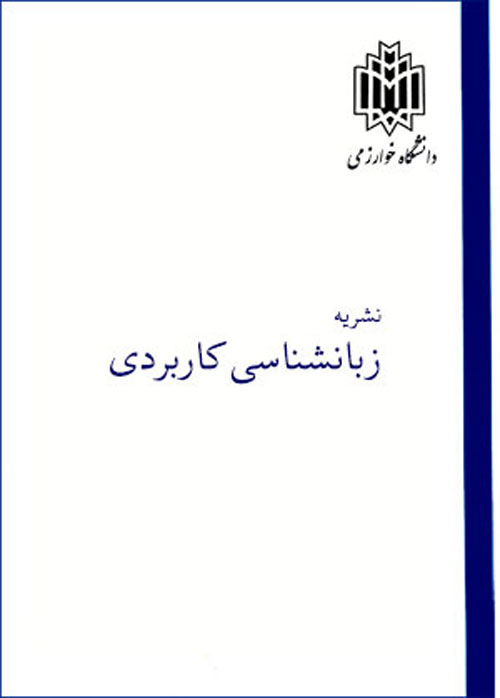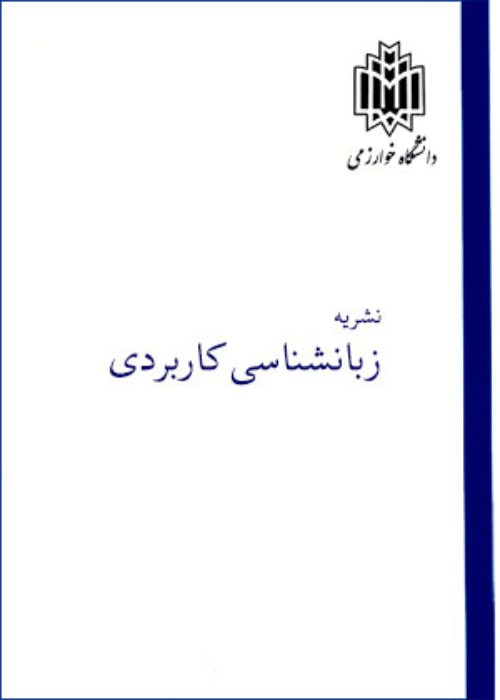فهرست مطالب

Iranian Journal of Applied Linguistics
Volume:20 Issue: 2, Sep 2017
- تاریخ انتشار: 1396/10/30
- تعداد عناوین: 6
-
-
Pages 1-34This study aimed to compare the underlying measures of male and female high- school students social capital in terms of regional variations and gender and investigate the relationship between those measures and the student's foreign language (FL) achievement. To this end, a number of 904 third-grader high school students (278 male and 626 female) from two educational districts (privileged district (PD) and less-privileged district (LD)) participated in the study. They filled out the Student Social Capital Questionnaire and took an English language achievement test. The results showed that the students in the PD outperformed their counterparts in the LD. Furthermore, group statistics and t-test results suggested variations among the groups of students in terms of such factors as mothers involvement, institutional trust, intergenerational closure, and parents educational aspiration. Pearson product-moment correlation indicated that there was a significant negative correlation between male and female student's participation in social networks and religious activities on the one hand, and their foreign language achievement on the other hand. However, there was a significant positive correlation between intergenerational closure and parents educational aspiration and female student's English scores on the S-test. The findings have implications for families and school members to provide students with hopeful and positive aspirations and intimate family environments and learning environments, which can enhance their FL achievement.Keywords: Social capital, Regional variation, Gender, Foreign language achievement
-
Pages 35-79This paper focuses on the impact of an asynchronous online discussion forum on the development of students ability in and attitudes toward writing in English. Two groups of third-year students (N = 60) majoring in English were assigned to two treatment and control groups, each receiving different types of feedback. Students in the treatment group were required to participate in an online learning environment and exchange feedback with their peers, whereas students in the control group received the traditional face-to-face feedback provided by the teacher. The results of a pre-test, a post-test, and a survey revealed that students writing in the treatment group significantly improved, both semantically and syntactically, and they expressed more positive attitudes toward writing. The findings also indicated that as a result of engaging in the asynchronous online discussion forum and exchanging feedback with peers, students exhibited more control over their work, involved more effectively with the learning tasks, collaborated more with their classmates, and employed self-assessment strategies to independently revise or rewrite their work. The implications of the study offer guidelines to improve and facilitate writing skill in EFL contexts.Keywords: Asynchronous online discussion forum, EFL teaching writing, L2 writing in Iran, Feedback provision
-
Pages 81-111In their attempt to shed light on the factors contributing to the incongruity between L2 reading teachers beliefs and practices, most of the researchers have resorted to teachers personal perspectives. As a partial replication of the research carried out by Karimi and Dehghani (2016), the current study sought to broaden this restricted scope by examining the role of teacher education in shaping L2 reading teachers beliefs/practices. Data were collected from 84 L2 reading teachers through a survey and follow-up classroom observations. Overall, both undergraduate and graduate teachers had an equally heightened tendency toward competence-based theoretical orientation. However, both groups substantially utilized instructional moves conforming to text-based orientation. There were also significant frequency differences between undergraduate and graduate teachers in their recourse to competence-based pedagogical moves. It is concluded that while the inclusion of a finite number of theoretical coursework may sway L2 teachers to sanction competence-based theoretical orientation, a more clinical approach to teacher education should be embraced to promote the symbiotic belief-practice relationship among L2 reading teachers.Keywords: Competence, based orientation, Text, based orientation, L2 teachers, Teacher education
-
Pages 113-156This study examines the potential connections among learners willingness to communicate (WTC) in English, their perceptions of autonomy-supportive teaching and two individual difference variables, i.e. motivation and English speaking self-efficacy. Two hundred and five Iranian EFL learners responded to four questionnaires. The data obtained from the collected instruments were subjected to structural equation modeling (SEM). The findings revealed significant positive paths from autonomy-supportive teaching to motivation, WTC in English, and English speaking self-efficacy. Further significant paths were found leading from motivation to WTC and from English speaking self-efficacy to motivation. The findings also indicated that autonomy-supportive teaching style and English speaking self-efficacy could indirectly affect learners WTC through the mediation of motivation. Furthermore, autonomy-supportive teaching was found to indirectly predict learners motivation through the mediating role of self-efficacy. The implications of the study for teachers and teacher educators are discussed.Keywords: Autonomy, supportive teaching, Willingness to communicate, Motivation, English speaking self, efficacy
-
Pages 157-193This study was an attempt to evaluate the undergraduate TEFL program at Farhangian University. The university specializes in educating prospective teachers and the program is important since it is expected to equip the student teachers with the knowledge and skills necessary for qualified teachers. Hence, in this study, measures were taken to investigate the merits and demerits of the implemented TEFL program and explore the domains in which the program needs to be improved. The study assessed the program from the perspectives of 220 student teachers, 32 teacher educators, and 12 heads of departments and experts including the university deans, deputies, and research and teaching staff, through using three instruments, i.e. questionnaires, interviews, and observations in a mixed methods design .The findings indicated that the TEFL program did not address some educational and administrative needs as the participants believed that they were not enriched with the necessary skills, the practice of the learned theories, problem solving, critical thinking, flexibility, and innovation. Furthermore, this study demonstrated several theory- practice gaps in the curriculum.Keywords: Evaluation, Undergraduate TEFL program, Farhangian University, Merits, Demerit
-
Pages 195-228Understanding how to structure the Statement-of-the-Problem (SP) section of a thesis is necessary for EFL students to develop a logical argumentation for a problem statement. This study intended to compare Move structures of SP sections of theses written by native speakers of Persian (NSPs) and English (NSEs). To this end, 100 SP sections (50 SP sections written by NSEs and 50 written by NSPs) of theses in the field of English language teaching (ELT) were selected and analyzed by the researchers based on Swale's (1990, 2004) CARS models. The analysis of the data revealed that Move structures of SP sections of the two corpora were similar. In both corpora, the three Moves of Establishing a territory, Establishing a niche, and Presenting the present work were considered obligatory. There were some differences in the Steps and many Move pattern variations in the two corpora. The results can broaden the understanding of the nature and function of this genre and can have important implications for EFL instructors.Keywords: Genre analysis, Move structure, Statement, of, the, Problem sections, Cultural variations


